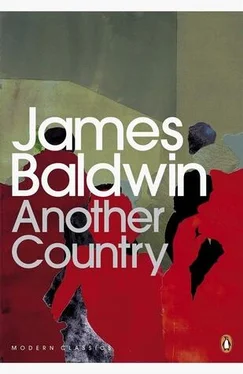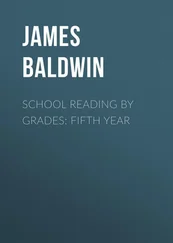“I’m sick of it, too,” said Vivaldo. “I don’t think of myself as a sensitive young man.”
“No? You sound like one and you act like one. You look down your nose at everybody. Yes,” he insisted, for Vivaldo looked at him in some surprise, “you think that most people are shit and you’d rather die than get yourself dirtied up in any of the popular arts.” Then he gave Vivaldo a deliberate, insolent once-over. “And here you are, in your best suit, and I bet you live in some dingy, ice-water apartment and you can’t even take your girl out to a night club.” His voice dropped. “The colored girl, Miss Scott, you see I do remember names, she’s your girl, isn’t she? That’s why you got pissed off at me. Man, you’re too touchy.”
“I thought you were too free.”
“I bet you wouldn’t have felt that if she were a white girl.”
“I’d have felt that about any girl who happened to be with me.”
But he wondered if Ellis were right. And he realized that he would never know, there would never be any way for him to know. He felt that Ellis had treated Ida with a subtle lack of respect. But he had spoken to her in the only way he could, and it was the way he spoke to everyone. All of the people in Ellis’ world approached each other under cover of a manner designed to hide whatever they might really be feeling, about each other or about themselves. When confronted with Ida, who was so visibly rejected from the only world they knew, this manner was forced to become relatively personal, self-conscious, and tense. It became entangled with an effort to avoid being called into judgment; with a fear that their spiritual and social promissory notes might suddenly be called up. By being pressed into the service of an impulse that was real, the manner revealed itself as totally false and because it was false, it was sinister.
Then, as Ellis poured himself another applejack and he poured himself another Scotch, he realized that the things which Ellis had, and the things which Richard was now going to have, were things that he wanted very much. Ellis could get anything he wanted by simply lifting up a phone; headwaiters were delighted to see him; his signature on a bill or a check was simply not to be questioned. If he needed a suit, he bought it; he was certainly never behind in his rent; if he decided to fly to Istanbul tomorrow, he had only to call his travel agent. He was famous, he was powerful, and he was not really much older than Vivaldo, and he worked very hard.
Also, he could get the highest-grade stuff going; he had only to give the girl his card. And then Vivaldo realized why he hated him. He wondered what he would have to go through to achieve a comparable eminence. He wondered how much he was willing to give — to be powerful, to be adored, to be able to make it with any girl he wanted, to be sure of holding any girl he had. And he looked around for Ida. At the same time, it occurred to him that the question was not really what he was going to “get” but how he was to discover his possibilities and become reconciled to them.
Richard, now, was talking, or, rather, listening to Mrs. Ellis; Ida was listening to Loring; Cass sat on the sofa, listening to Miss Wales. Paul stood near her, looking about the room; Cass held him absently and yet rather desperately by the elbow.
“Anyway — I’d like to keep in touch with you, maybe you’ve got something.” And Ellis handed him his card. “Why don’t you give me a ring sometime? and I meant what I said to Miss Scott, too. I produce pretty good shows, you know.” He grinned and punched Vivaldo on the shoulder. “You won’t have to lower your artistic standards.”
Vivaldo looked at the card, then looked at Ellis. “Thanks,” he said. “I’ll bear it in mind.”
Ellis smiled. “I like you,” he said. “I’m even willing to suggest an analyst for you. Let’s join the party.”
He walked over to Richard and Mrs. Ellis. Vivaldo walked over to Ida.
“I’ve been trying to find out about your novel,” Loring said, “but your young lady here is most cagey. She won’t give me a clue.”
“I keep telling him that I don’t know anything about it,” Ida said, “but he won’t believe me.”
“She doesn’t know much about it,” Vivaldo said. “I’m not sure I know an awful lot about it myself.” Abruptly, he felt himself beginning to tremble with weariness. He wanted to take Ida and go home. But she seemed pleased enough to stay; it was not really late; the last rays of the setting sun were fading beyond the river.
“Well,” said Loring, “as soon as you do have something, I hope you’ll get in touch with me. Richard thinks you’re tremendously talented and I’d certainly trust his judgment.”
He knew that Ida was puzzled and irritated by the mediocrity of his response. He tried to pump up enthusiasm, and watching Ida’s face helped. He could not imagine what she thought of Ellis, and rage at himself, his jealousy, his fear, and his confusion, contributed a saving intensity to his evasive reply. Loring seemed more certain than ever that he was a diamond in the rough, and Ida more certain than ever that he was in need of hands to push him.
And he himself felt, in a way he had not felt before, that it was time for him to take the plunge. This was the water, the people in this room; it impressed him, certainly, as far from fine, but it was the only water there was.
Miss Wales now looked over toward him, but he avoided her eyes, giving all of his attention to Ida.
“Let’s go,” he said, in a low voice, “let’s get out of here. I’ve had it.”
“You want to go now ? You haven’t talked to Miss Wales.” But he watched her eyes flicker toward the bar, where Ellis stood. And there was something in her face which he could not read, something speculative and hard.
“I don’t want to talk to Miss Wales.”
“Why on earth not ? You’re being silly.”
“Look,” he said, “is there someone here you want to talk to?” Oh, you idiot! he groaned to himself. But the words were said.
She looked at him. “I don’t know what you mean. What are you talking about?”
“Nothing,” he said, sullenly. “I’m just crazy. Don’t mind me.”
“You were thinking something. What were you thinking?”
“Nothing,” he said, “really nothing.” He smiled. “I don’t care. We can stay if you want to.”
“I was only staying,” she said, “on account of you.”
He was about to say, Well then, we can go, but decided that it would be smarter not to. The doorbell rang. He said, “I just wanted to avoid getting involved in a supper deal with any of these people, that’s all.”
“But who, ” she persisted, “did you think I wanted to talk to?”
“Oh,” he said, “I thought if you were really serious about that singing business, you might have wanted to make an appointment with Ellis. I imagine he could be helpful.”
She looked at him wearily, with mockery and pity. “Oh, Vivaldo,” she said, “what a busy little mind you’ve got.” Then her manner changed, and she said, very coldly, “You don’t really have the right, you know, to worry about who I talk to. And what you’re suggesting doesn’t flatter me at all .” She kept her voice low, but it had begun to shake. “Maybe, now, I’ll behave like what you think I am!” She walked over to the bar and stepped between Richard and Ellis. She was smiling. Ellis put one hand on her elbow and his face changed as he spoke to her, becoming greedier and more vulnerable. Richard went behind the bar to pour Ida a drink.
Vivaldo could have joined them, but he did not dare. Her outburst had come so mysteriously, and with such speed, that he was afraid to think of what might happen if he walked over to the bar. And she was right; he was wrong. Who she talked to was none of his business.
Читать дальше












